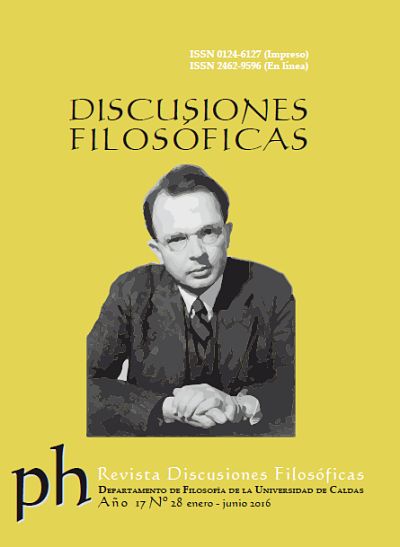Authors
Abstract
The main thesis that I shall hold in this paper can be expressed briefly: the given has a referential correlate, not only by fact but also by law. That it has a referential correlate means that a large part of our beliefs about the world have their foundation in the giving of the world’s objects. That this is a question of fact as well as of law means that the given is the source of a large part of our beliefs, not only from a descriptive phenomenology, but also normatively from an epistemological point of view: this must be so if we intend to attribute knowledge about the world and deal with the world in the way that we do.
Keywords
References
Brandom, R. La articulación de las razones. Madrid: Siglo XXI. 2002. Impreso
Brewer, B. Perception and Reason. Oxford: Clerendon Press. 1999. Impreso.
Carr, D. The Paradox of Subjectivity. Oxford: Oxford University Press.
1999. Impreso.Chisholm, R. Brentano and Meinong Studies. Amsterdam: Rodolpi B.V. 1982. Impreso.
Dennett, D. Content and Consciousness. London: Routledge & Kegan Paul. 1969. Impreso.
Foley, R. Working without a net: A study of egocentric epistemology. Oxford: Oxford University Press. 1993. Impreso.
___. Intellectual Trust in Oneself and Others. Camnbridge: Cambridge University Press. 2004. Impreso.
Frege. Ensayos de semántica y filosofía de la lógica. Madrid: Tecnos. 1998. Impreso.
Fumerton, R. Meta-epistomology and Scepticism. Lanham: Rowman & Littlefield. 1995. Impreso.
Husserl, E. Ideas relativas a una fenomenología pura y una filosofía fenomenológica. México, D. F: Fondo de Cultura Económica. 1992. Impreso.
___. Investigaciones Lógicas. Barcelona: Altaya. 1995. Impreso.
___. La crisis de las ciencias europeas y la fenomenología trascendental. Barcelona: Altaya. 2000. Impreso.
Laera, R. Los desvíos de la razón: el lugar de la facticidad en la cadena de justificaciones. Buenos Aires: Miño y Dávila. 2001. Impreso.
Lehrer, K., & Kim, K. “The Fallibility Paradox”. Philosophy and Phenomenological Research, 1990: 99-107. Impreso.
Lemos, N. Common Sense: A contemporary defence. Cambridge: Cambridge University Press. 2004. Impreso.
McDowell, J. Mente y mundo. Salamanca: Sígueme. 2003. Impreso.
McLear, C. “The Kantian (Non)‐conceptualism Debate”. Philosophy Compass, 9(11), 2014: 769-790. Impreso.
Meinong, A. Teoría del objeto y presentación personal. Buenos Aires: Miño y Dávila. 2008. Impreso.
Peacocke, C. A Study of Concepts. Cambridge, MA: MIT. 1992. Impreso.
___. “Objectivity”. Mind, 2009: 739-769. Impreso.
Pinker, S. The Stuff of Thought : Language as a Window Into Human Nature. New York: Viking. 2007. Impreso.
Platinga, A. Warrant: The Current Debate. Oxford: Oxford University Press. 1993. Impreso.
Pritchard, D. “Defusing Epistemic Relativism”. Synthese, 2009: 397-412. Impreso.Quine, W. V. Desde un punto de vista lógico. Barcelona: Orbis. 1984. Impreso.
Russell, B. “Knowledge by acquaintance and knowledge by description”. Proceedings of the Aristotelian Society, 1910: 108-128. Impreso.Sachs, C. Intentionality and the Myths of the Given. London: Pickering and Chatto. 2014. Impreso.
Searle, J. Intencionalidad: un ensayo en la filosofía de la mente. Madrid: Tecnos. 1992. Impreso.Sellars, W. Empiricism and the Philosophy of Mind. Cambridge: Harvard University Press. 1997. Impreso.
Van Fraassen, B. Laws and Symmetry. Oxford: Oxford University Press. 1989. Impreso.
Watkins, E. “Kant, Sellars, and the myth of the given”. The Philosophical Forum, 43(3), 2012: 311-326. Impreso.
Williams, M. “Dretske on Epistemic Entitlement”. Philosophy and Phenomenological Research, 2000: 607-612. Impreso.
Williamson, T. Knowledge and its Limits. New York: Oxford University Press. 2002. Impreso.

 pdf (Español (España))
pdf (Español (España))
 FLIP
FLIP




























